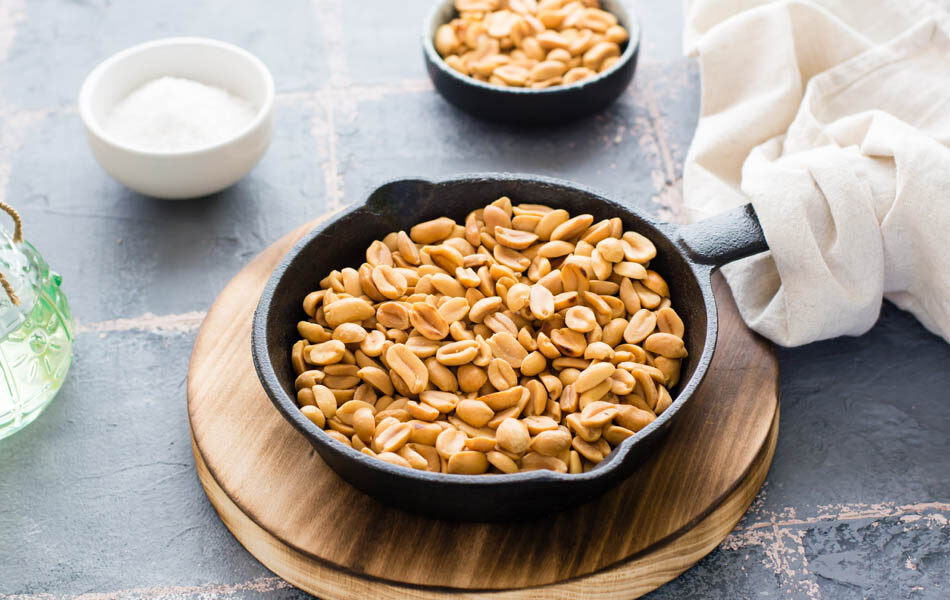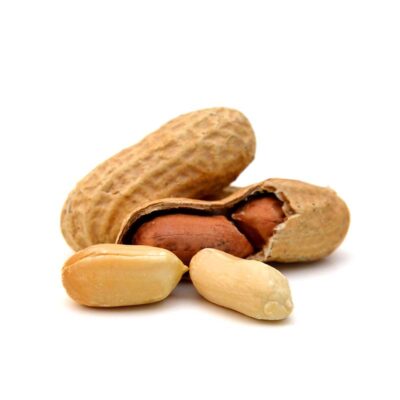Are Peanuts Good for Diabetes? Benefits and Possible Risks
Eating peanuts can help prevent you from developing diabetes, but can they help those already managing the condition? Here you will discover the nutritional value, glycemic index, and health benefits of peanuts.

Nut consumption is generally associated with healthy eating. Although technically not a nut, peanuts have many of the same health benefits as tree nuts.
Peanuts and peanut products like peanut butter have many healthy properties. Adding peanuts, among other nuts, to a balanced diet benefits human health. They have an excellent nutritional profile, rich in protein, fiber, and healthful fats.
People with diabetes must monitor their blood sugar levels and keep them within the target range. Doing so requires a mindful approach to eating, as particular foods cause blood sugar levels to rise too quickly.
Peanuts are fairly low in carbohydrates compared to other nuts, so you’re probably wondering if they are a safe addition to a diabetes diet. Keep reading as we outline the perks and peanut-eating concerns for people with diabetes.
Are Peanuts Good for Diabetes?
Peanuts are a good choice for your diet if you have diabetes. They contain plenty of healthful nutrients and only mildly impact blood glucose levels. Along with aiding blood glucose control, eating peanuts may help you lose weight, maintain a healthy weight, and decrease cardiovascular disease risk.
Peanuts do not cause blood sugar spikes because they have a low glycemic index. Peanuts and peanut butter consumption in the morning may help keep your blood sugars steady by moderating postprandial glucose and enhancing satiety.
The healthy fats, plant-based protein, and fiber content promote satiety, making it easier to control your appetite when following a weight-loss diet. Protein may help you burn more calories while providing a good energy source for your workouts.
Raw peanuts contain magnesium. Magnesium is an essential nutrient to control blood sugar. It plays a role in your body’s insulin secretion and may improve insulin sensitivity. Because of its various activities in the body, magnesium supports weight loss.
People with diabetes are at greater risk of developing high blood pressure as diabetes causes damage to the arteries. A peanut-enriched diet for weight loss can help reduce high blood pressure, reducing the risk of heart disease.
Consuming peanuts and other tree nuts may also effectively reduce triglycerides and total cholesterol levels in patients with type 2 diabetes. Again, this is another factor that may lower cardiovascular disease risk.
Peanuts Nutritional Value
When assessing foods for your diabetes diet, it’s critical to look at the nutrition facts. It helps you keep track of your calorie intake and macros so you can control your blood glucose levels. Peanuts and peanut butter are loaded with nutrients to keep your body healthy.
Here are the macronutrients present in 100 grams of peanuts.

As you can see, peanuts are high in fats, with 49.7g per 100g serving. Of course, this is a fairly large portion size. You should limit your peanut intake to avoid taking in too much fat. The good news is that the majority comes from polyunsaturated fat – a type of healthy fat.
Reducing your saturated fat intake and eating more unsaturated fat is good for your heart health. It reduces your LDL cholesterol levels and lowers your risk of heart disease.
Remember that processed peanuts, such as sugar peanut products and peanut candies, contain added salt, sugar, and more fat than natural, raw peanuts. Always check the nutrition label when purchasing peanuts.
If buying peanut butter, opt for natural peanut butter with few ingredients or make your own homemade peanut butter.
Glycemic Index of Peanuts
Peanuts have a glycemic index of 14 and a glycemic load of 1, making them a very low GI food. Although they contain carbs, eating peanuts won’t send your blood sugar levels soaring.
They have a low impact on blood glucose which is one of the many reasons they are a good snack for people with diabetes.
Almost all nuts are low on the glycemic index. High GI foods trigger a rapid increase in blood sugar levels and should remain limited in a diabetes diet.
5 Benefits of Peanuts for Diabetes
We’ve touched on some of the health benefits of peanut consumption for people with diabetes. Let’s look at 5 more reasons to eat peanuts as a morning, afternoon, or evening snack. You can even add peanuts and nut butter to healthy dinner recipes.
#1 Blood sugar control
As low GI foods with a low glycemic load, peanuts and peanut butter are better for maintaining steady blood sugar levels. Healthy fats, fiber, and protein keep blood sugar in check.
When incorporated into a low-carb diet, peanuts can improve fasting blood glucose and postprandial blood glucose in people with diabetes. You can eat them without worrying about adverse effects on your blood glucose content. Just be mindful of your portion sizes!
#2 Weight management
If you want to improve weight control, peanuts can help. Although high in fat and calories, peanuts can be good for weight loss. They can help you have fewer hunger cravings, reduce your desire to eat, and prevent the risk of weight gain from overeating.
Keeping a healthy weight is critical in diabetes management. It can help improve your condition, give you more energy, and aid cardiovascular disease control. For some people, losing weight can even lead to diabetes remission, mitigating the need for diabetes medication.
Being overweight or obese harms your cardiovascular health. Excess weight, especially around the abdominal region, can cause insulin resistance. So, losing belly fat with a good diet and exercise strategy could help you improve your insulin production.
#3 Source of protein
Peanuts have a significant amount of plant-based protein (24.4g). High-protein diets with both plant and animal protein sources positively affect glycemic control in people with type 2 diabetes. Protein takes longer to digest than carbs, contributing to a more gradual rise in blood sugars.
Peanuts may be among the best foods for a plant-based diet for diabetes. In limited quantities, you can also eat peanuts as a vegetarian keto snack if following the keto diet for diabetes.
#4 Have antioxidant properties
Peanuts contain a good dose of antioxidants, including vitamin E, manganese, and B vitamins. Peanut butter is also pretty antioxidant-rich. Antioxidants protect the cells from free radical damage, which helps to ward off cardiovascular disease, cancer, and other chronic diseases.
Vitamin E boosts the immune system, strengthening your body’s natural defense against sickness. B vitamins are responsible for many cellular functions, helping you sustain general health and wellbeing. Manganese is involved in calcium absorption, metabolic processes, and blood sugar regulation.
#5 Good for heart health
Peanuts, peanut butter, and peanut products such as oils are filled with heart-healthy fats. They contain a substantial amount of monounsaturated and polyunsaturated fatty acids that boost HDL cholesterol and lower LDL cholesterol levels.
Consumption of peanuts and tree nuts is associated with a lower risk of total cardiovascular disease and a lower risk of coronary heart disease. High blood pressure patients can also benefit from eating peanuts regularly. They contain arginine, which helps decrease blood pressure.
Side Effects of Eating Peanuts
Like any food, peanuts are not suitable for all of us. They have properties that require you to limit consumption. For some people, peanuts may need to be avoided altogether. Before you dive into a pack of peanuts, consider the possible side effects below:
- Allergic reaction: Peanuts can cause a severe allergic reaction for certain people, even in tiny amounts. In fact, peanuts are one of the most common allergens, and many people must steer clear of all peanut varieties and peanut products.
- Gaining weight: Peanuts are very high in calories. Just a handful of peanuts has approximately 160 calories. Overeating these tasty snacks could result in a high caloric intake that exceeds your daily budget.
- Too much salt and sugar: Many peanut varieties have a high salt and sugar content. Choose peanuts without extra sodium, sugar, and other additional ingredients to avoid negatively impacting your health. Salted and dry roasted peanuts may be beneficial in small amounts, but it’s best to stick to unsalted, skin-on peanuts for maximum nutrition.
- Too much fat: Peanuts are very high in fats. While most of the fat content is good, you can still take in too much of this particular macronutrient. All dietary fat can cause you to gain extra pounds if you eat too much. Moderation is vital.
How to Eat Peanuts for Diabetes
There are lots of ways to enjoy peanuts in your diet. You can eat them raw, roasted, fried, and blanched. They are also made into peanut butter – another rich source of nutrients. Aside from munching on peanuts as a snack, you can add them to dishes like salads, pasta, and vegetables.
For optimal health advantages, select skin-on peanuts. Peanut skins have more powerful antioxidants than any other part. When peanuts are eaten with their skins, their antioxidant capacity doubles. Their health-boosting properties are essentially at optimal levels.
FAQs
No, peanuts do not cause blood glucose levels to rise sharply. Like peanut butter, peanuts are a low GI food that delivers a more gradual and stable rise in blood glucose. When paired with higher GI foods, peanuts may help to reduce the impact on insulin levels.
Nuts are one of the best foods for keeping your blood sugar under control. Most nuts are low glycemic foods and don’t significantly impact your blood sugars. If you have diabetes, nuts are a hard-to-beat snack for filling you up, supporting your heart, and aiding glycemic control.
Generally, a person with diabetes can safely consume a handful of peanuts daily. That’s about the equivalent of one ounce or 28 grams. As peanuts are high in calories and fat, restricting your intake to moderate amounts is essential for diabetes management. Overconsumption may result in you gaining weight.
A Word From Nutritionist
Eating peanuts in moderation can improve your overall health and help you manage your diabetes. The good fats are especially good for your heart’s health, lowering triglyceride and LDL cholesterol levels. The abundance of nutrients also contributes to lowering blood pressure.
The American Diabetes Association has long recommended peanuts and peanut butter for people with diabetes. This is primarily because their low GI rating supports glycemic control. You can add them to a healthy diet and enjoy the many benefits they bring.
A nutritious diet is key for diabetes control. A colorful variety of fruits, vegetables, whole grains, nuts, and seeds are ideal choices. Peanuts are a member of the legume family. Legumes are especially good for diabetes as they positively affect markers of glycaemic control.
Regular physical activity is another crucial element because it can help the body moderate sugar content in your bloodstream. You can practice regular exercise by running 3 days a week or going for slow jogs to reduce impact. It will also help you burn fat while maintaining muscle.
Peanut butter is associated with similar benefits to peanuts, and regular consumption is associated with a reduced risk of developing diabetes. Other good alternatives to peanut butter include almond butter and sunflower seed butter.
Before boosting your intake of peanuts and nut butter, talk to your doctor for professional medical advice. You must balance eating enough peanuts to reap the perks and exceeding your daily carb, fat, and calorie intake.
Conclusion
It’s official – peanuts are a positive addition to your diet if you have diabetes. They have many benefits that can make managing diabetes that little bit easier. They’re also a super tasty snack when you need something filling to get you through the day.
For best results, try to purchase peanuts in their purest form to avoid added salt, sugar, and fat that do not boost your health. Many premade peanut snacks can quickly knock your daily calorie and carb allowance off balance.

















































 Select your language:
Select your language: 








